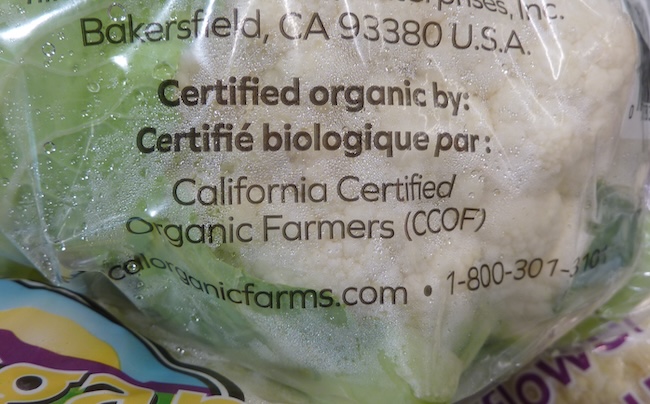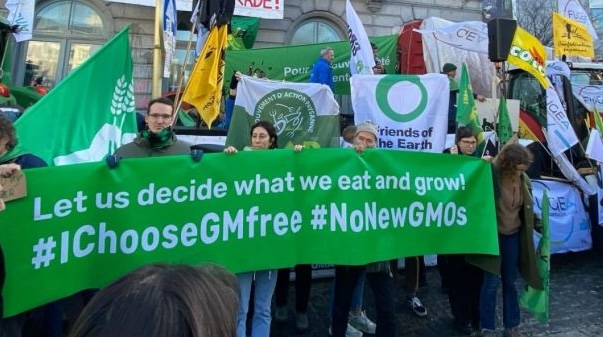
OrganicEye files Legal Complaint Against CCOF, the Nation’s Largest Organic Certifier, Citing Conflict of Interest
Prior to 2002, organic certifiers took on many roles, including certification and advocacy, and raised money from the industry to underwrite their work.
Yet, when the USDA began to implement the National Organic Program in that year, the agency required organic certifiers to separate these roles, so that the certification entity could operate without a conflict of interest. For example, NOFA/Mass separated its advocacy and certification arms, and it spun off Baystate Organic Certifiers as an independent entity with its own governance and offices.
This mandate underscores the importance that the relationship between an organic certifier and the entity it is certifying, such as a farm or co-packing facility, be arms-length and completely objective — which is addressed in the federal code.
Believing something was amiss, watchdog organization OrganicEye filed a legal complaint with the USDA against CCOF (California Certified Organic Farmers), who claims to be the largest organic certifier in the country. OrganicEye alleges that there is strong evidence to suggest that the certifier has received hundreds of thousands of dollars above and beyond certification fees, in addition to CCOF’s certification arm not operating in a truly independent manner.
The legal complaint to the USDA was based on the following two issues:
1) OVERLAP IN MANAGEMENT AND GOVERNANCE
* CCOF is legally structured into three different entities, with each filing separate IRS Form 990s, but OrganicEye contends that these entities are separate on paper only.
— CCOF, Inc., a 501(c)(5) nonprofit, is a member-directed, politically active entity chartered as a trade association.
— CCOF Certification Services, LLC, a 501(c)(5) nonprofit, is a wholly owned subsidiary of CCOF, Inc. — the certification body.
— CCOF Foundation, a 501(c)(3) is a tax-exempt nonprofit — the entity that does advocacy and outreach.
* CCOF, Inc. wholly owns CCOF Certification Services, LLC, and CCOF Inc.’s board of directors is responsible for appointing all of the CCOF Certification Services, LLC Management Committee members.
* CCOF, Inc.’s board of directors is responsible for appointing all of the CCOF Foundation trustees.

* All three CCOF entities — CCOF, Inc., CCOF Certification Services, LLC, and CCOF Foundation — have the same office address, and all three corporate entities share the same domain name ccof.org.

* Kelly Damewood is the CEO of CCOF, Inc.
Kelly Damewood is also chair of the CCOF Certification Services, LLC Management Committee, which is the governing body for CCOF Certification Services, LLC.
Kelly Damewood is also chair of the CCOF Foundation Board of Trustees, which is the governing body for the CCOF Foundation.

* OrganicEye believes that there is strong evidence to suggest that the CCOF Foundation is using staff, on a contractual basis, from CCOF, Inc. and/or CCOF Certification Services, LLC.
2) FEES PAID ABOVE AND BEYOND CERTIFICATION FEES
* OrganicEye is asserting that between 2018-2023, several organic corporations — all of whom it says are certified by CCOF Certification Services, LLC — gave significant amounts to CCOF, figures above and beyond certification fees. OrganicEye has calculated that the amounts consist of donations and advertising value in the following amounts:
Cal-Organic/Grimmway Farms — $133,580
Driscoll’s — $130,795
Sunview Vineyards — $52,825
Federal code 7 USC 6515 (h)(2): Requirements of certifying agents says the following:
h) Conflict of interest
Any certifying agent shall not —
(2) accept payment, gifts, or favors of any kind from the business inspected other than prescribed fees
RESPONSE FROM CCOF
On February 1st, Organic Insider reached out to Kelly Damewood, CEO of CCOF, Inc., and asked her to respond via email about the specific allegations in the complaint, for a story to be published on February 7th.
She provided a general statement, which included the following:
“OrganicEye is an uncredible organization seeking to quiet the voices of organic producers. Their current campaign attempts to stop certifiers from engaging with the communities they serve and to cancel the voice of organic farmers in governing mission-based organic nonprofits. I find this effort to attack a mid-size, audited nonprofit disturbing.”
According to publicly available IRS Form 990s, which showed CCOF’s 2021 revenue totaling approximately $27M (CCOF Certification Services, LLC — $17.7M; CCOF, Inc. — $7.4M ; CCOF Foundation — $1.4M), and based on an analysis of other well-known organic nonprofit groups, including Oregon Tilth, Center for Food Safety, Non-GMO Project, Rodale Institute, OMRI and Organic Consumers Association, it appears that CCOF is one of the largest nonprofits in the organic industry.
MOTIVATION BEHIND LEGAL COMPLAINT
When asked about what led OrganicEye to investigate a possible conflict of interest at CCOF, the watchdog group said it was trying to determine why some legacy certifiers are willing to certify giant hydroponic (soil-less) operations and industrial livestock operations, while many of their counterparts do not view such operations as legal under the Organic Foods Products Act of 1990 and federal regulations.
It is now up to the USDA’s National Organic Program to decide whether this legal complaint against CCOF has merit or not; more specifically, whether CCOF needs to change its operating and governance structure to comply with the law.
On its own website, CCOF has acknowledged the seriousness of the USDA’s mandate that certification agencies be free from conflict of interest.

Organic Insider will keep its readers informed as developments related to this matter unfold.
 |
With gratitude, 
Max Goldberg, Founder |
Quick Hits
* Sakara has named former Glossier executive Henry Davis as its new CEO, with founders Danielle Duboise and Whitney Tingle assuming new positions as executive chairs.
* Mad Capital is partnering with RSF Social Finance to transition more acres to regenerative organic in the Midwest and High Plains.
* Daily Harvest’s January Jumpstart program features GLP-1-focused meal plans.
* Natural Grocers released its 2023 ESG report.
* Impact investor, author and food activist Robyn O’Brien has joined Montcalm, a San Francisco-based wealth management and capital markets trading firm.
* Wild Idea Buffalo Co. became the first commercial meat operation in the U.S. to achieve Regenerative Organic Certified® status.
* Heather Wainer of WholeFoods Magazine received the Organic & Natural Health Association’s Champion Award.
* Good Culture is expanding its Path to Pasture program, which aims to get more cows out of the feedlots and onto pastures.
* A cautionary tale of experimenting with genetically-modified mosquitoes in Uganda.
* Acclaimed podcaster Dr. Andrew Huberman has launched Mateina, his organic yerba mate drink, into the U.S. market.
* Organic brand OCHO Candy closed its doors, as of February 1st.
New Organic Products
Regenerative Organic Certified® Salted Dark Magic All-One Chocolate from Dr. Bronner's
Dr. Bronner's has announced that its Salted Dark flavor of chocolate is now Regenerative Organic Certified®, the first-ever chocolate product in the world to achieve this certification. It is made with a unique blend of cocoa from Ghana and Ivory Coast, coconut sugar from Indonesia, cocoa butter from Congo, and bourbon vanilla from Madagascar. Available at retailers nationwide and on the company's website.Ultimate Athlete Performance Shot from Uncle Matt's Organic
New from Uncle Matt's Organic is its Ultimate Athlete Performance Shot. The 2 oz organic shot was formulated in collaboration with the Denver Broncos' in-house chef and is a proprietary blend of beets, orange juice, coconut water, ginger and lemon juice -- all designed to support peak performance. Available on the company's website and rolling out to select retailers nationwide in the coming months.Limited Release Regenerative Organic Certified® Red Blend from Bonterra Organic Estates
Bonterra Organic Estates recently introduced its Regenerative Organic Certified® 2022 Red Blend -- the latest addition to its Bonterra Estate Collection. This 100% estate-grown, limited release is a unique blend of petite sirah and malbec, with a touch of zinfandel, and this full-bodied wine boasts black cherry, black currant and spice notes. Exclusively available on the company's website.Margarita and Zero-Sugar Margarita Mixes from Baja Bob's
Last month, Baja Bob's unveiled three new USDA certified organic mixers: Zero-Sugar Triple Citrus Margarita Mix, which is the first zero-sugar, organic mixer on the market; Triple Strawberry Lemonade Margarita Mix, which is sweetened with cane sugar and fruit juices; Triple Citrus Margarita Mix, which contains 20g of carbs and 81 calories. Available at national retailers such as Total Wine and regional grocers and liquor stores, including Raley’s and Albertsons.
Weekly News Summaries


EU Parliament Votes to Remove Safety Checks and Liability for GMO 2.0 Crops
An absolutely massive blow for consumers, and a sign that the EU is becoming increasingly completely beholden to the GMO and chemical companies.

IFOAM - Organics International Stands Firm on the Importance of Grower Group Certification
By Karen Mapusua
IFOAM - Organics International remains extremely concerned about the litigation against the USDA, something we covered in great detail here and here.

Trek One Capital completes Acquisition of Alter Eco
Keith Bearden was recently appointed CEO of Alter Eco and partnered with Trek One to lead the acquisition of the company.

Federal Court Halts Spraying of Monsanto's Dicamba Pesticide Across Millions of Acres of Cotton, Soybeans
A sweeping victory for family farmers and dozens of endangered plants and animals.

ESG Litigation for Greenwashing Claims is Growing
By Elizabeth Crawford
Big Ag and Big Food should be very careful about their environmental claims, as litigation against greenwashing is surging.

Forum Brands acquires Lola
By Anna Hensel and Cale Guthrie Weissman
Lola, a period care brand known for its organic cotton tampons, pads and other sanitary products, has been sold to Amazon aggregator Forum Brands.


‘Unacceptable Greenwashing’: Scottish Farmed Salmon Should not be Labeled Organic, say NGOs
By Karen McVeigh
The Soil Association, a British organization that certifies food in the UK as organic, has been accused of misleading consumers over its labeling of Scottish farmed salmon.

Austria, France and Italy to Raise Lab-Grown Meat Concerns with EU
Some of the concerns include how to guarantee the safety of lab-grown meat and how to “prevent the creation of monopolies or oligopolies on the food market."

Arizona is the Next State to Propose Cultivated Meat Censorship
By Deniz Ataman
Arizona, along with Florida and Texas, is the next state to propose stringent laws like censorship and bans for cultivated meat products.
Want to share this newsletter on social media? You can use this link: Newsletter Link
The material in this newsletter is copyrighted and may be reprinted by permission only. All requests must be in writing. Please use our contact form to request republication rights.
Newsletter Archive
Quick Hits
* Sakara has named former Glossier executive Henry Davis as its new CEO, with founders Danielle Duboise and Whitney Tingle assuming new positions as executive chairs.
* Mad Capital is partnering with RSF Social Finance to transition more acres to regenerative organic in the Midwest and High Plains.
* Daily Harvest’s January Jumpstart program features GLP-1-focused meal plans.
* Natural Grocers released its 2023 ESG report.
* Impact investor, author and food activist Robyn O’Brien has joined Montcalm, a San Francisco-based wealth management and capital markets trading firm.
* Wild Idea Buffalo Co. became the first commercial meat operation in the U.S. to achieve Regenerative Organic Certified® status.
* Heather Wainer of WholeFoods Magazine received the Organic & Natural Health Association’s Champion Award.
* Good Culture is expanding its Path to Pasture program, which aims to get more cows out of the feedlots and onto pastures.
* A cautionary tale of experimenting with genetically-modified mosquitoes in Uganda.
* Acclaimed podcaster Dr. Andrew Huberman has launched Mateina, his organic yerba mate drink, into the U.S. market.
* Organic brand OCHO Candy closed its doors, as of February 1st.




